Charter for Catholic Schools in the Edmund Rice Tradition
OUR TOUCHSTONES

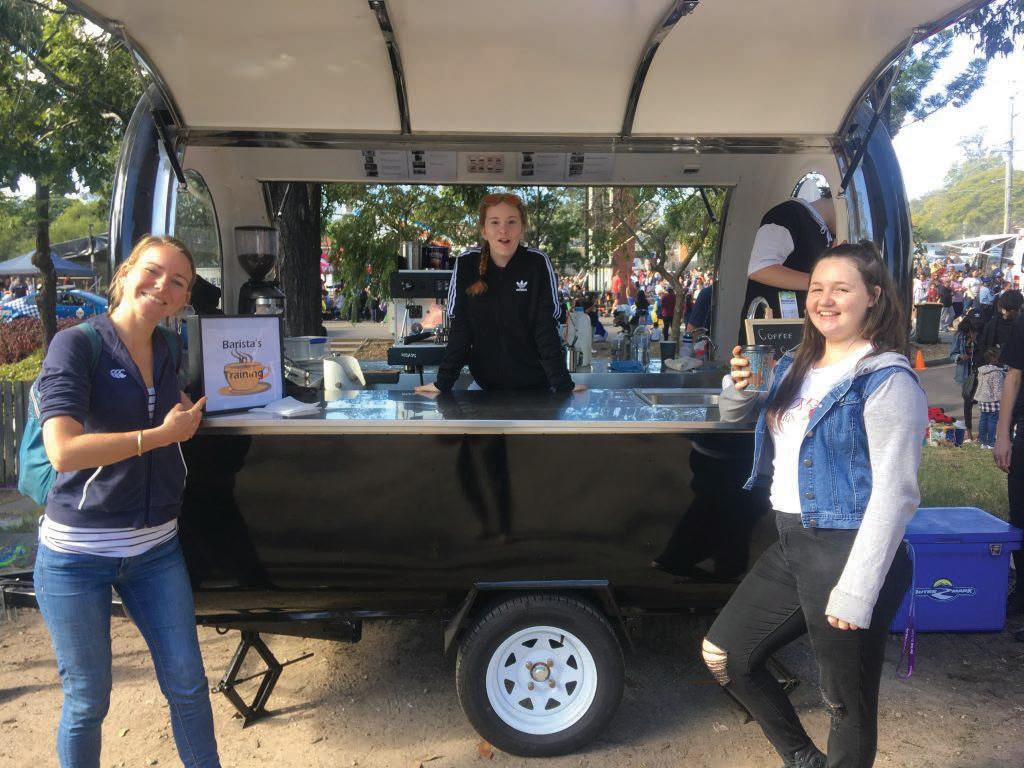


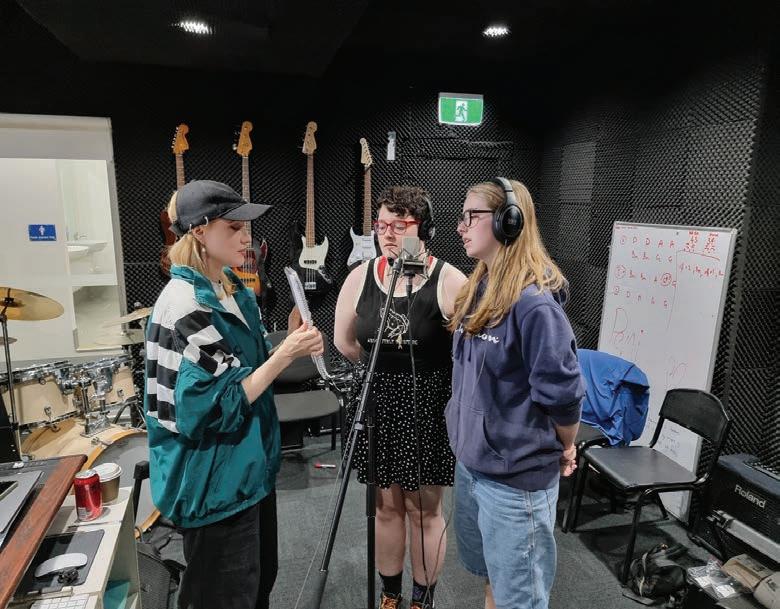
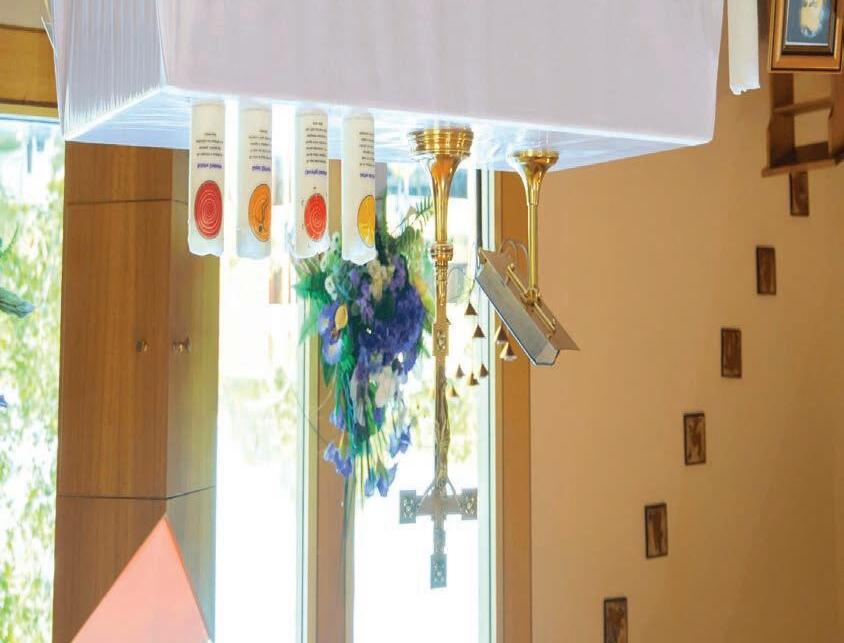
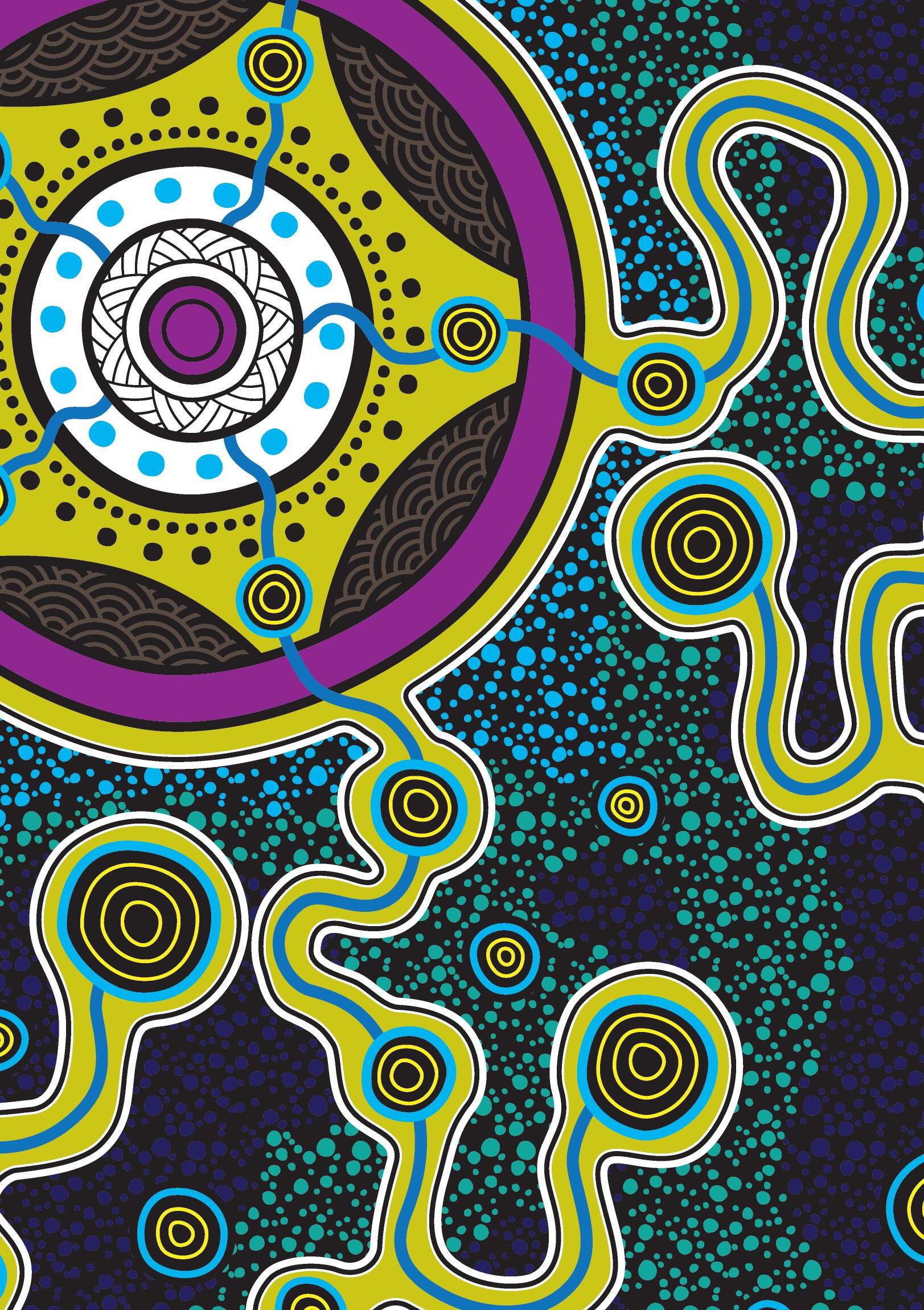








We acknowledge the Aboriginal Peoples as the Traditional Owners of the Country/s on which our schools and offices are located. We also acknowledge the Torres Strait Islander Peoples as the Traditional Owners of the Torres Strait Islands.
We pay our respects to Ancestors, Elders, and leaders of the future as well as to Aboriginal and Torres Strait Islander members of the EREA community. Edmund Rice Education Australia values the spiritual connectedness and relatedness to Country/s and to all living systems of the world’s oldest continuous living cultures –sovereign Countrys never ceded.
We value Aboriginal and Torres Strait Islander Knowings and recognise and honour their stories, cultures, and achievements as we walk together for mutual liberation and a truth-telling history for all Australians.
In this spirit, we are accepting the invitation contained in the Uluru Statement from The Heart to listen to the First Peoples of Australia and work together for reconciliation, justice, equity, and healing.
by Robert Paul Designs
Our national community was invited to engage in a process of experience, analysis, reflection and action in relation to our Charter.
In doing so, we embraced a First Nations view of our process, upholding tradition, respect and protocol, depicting the diverse conversations, unexpected turns and perspectives contributing to consensus.
Communication, listening and feedback lines extend between the large circle (EREA as a national entity) and the outer circles (our communities).
The leadership and responsibilities of the EREA Council, Governing Bodies and Principals, representing schools and young people, are reflected in the overlapping central circles.
The EREA Charter is the contemporary educational expression of the charism of Blessed Edmund Rice in Australia.
Inspired by the Spirit in proactively responding to current realities and hope-filled futures, we are called to faithfulness and transformation as Catholic Schools in the Edmund Rice tradition.
Through a liberating education, based on a Gospel spirituality, within an inclusive community, committed to justice and solidarity, we co-create a better world for all.
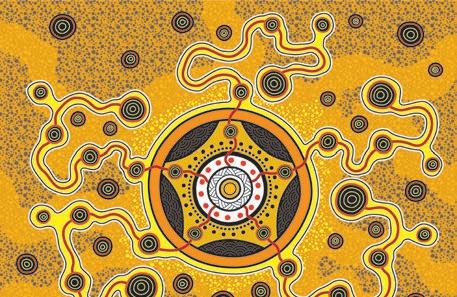
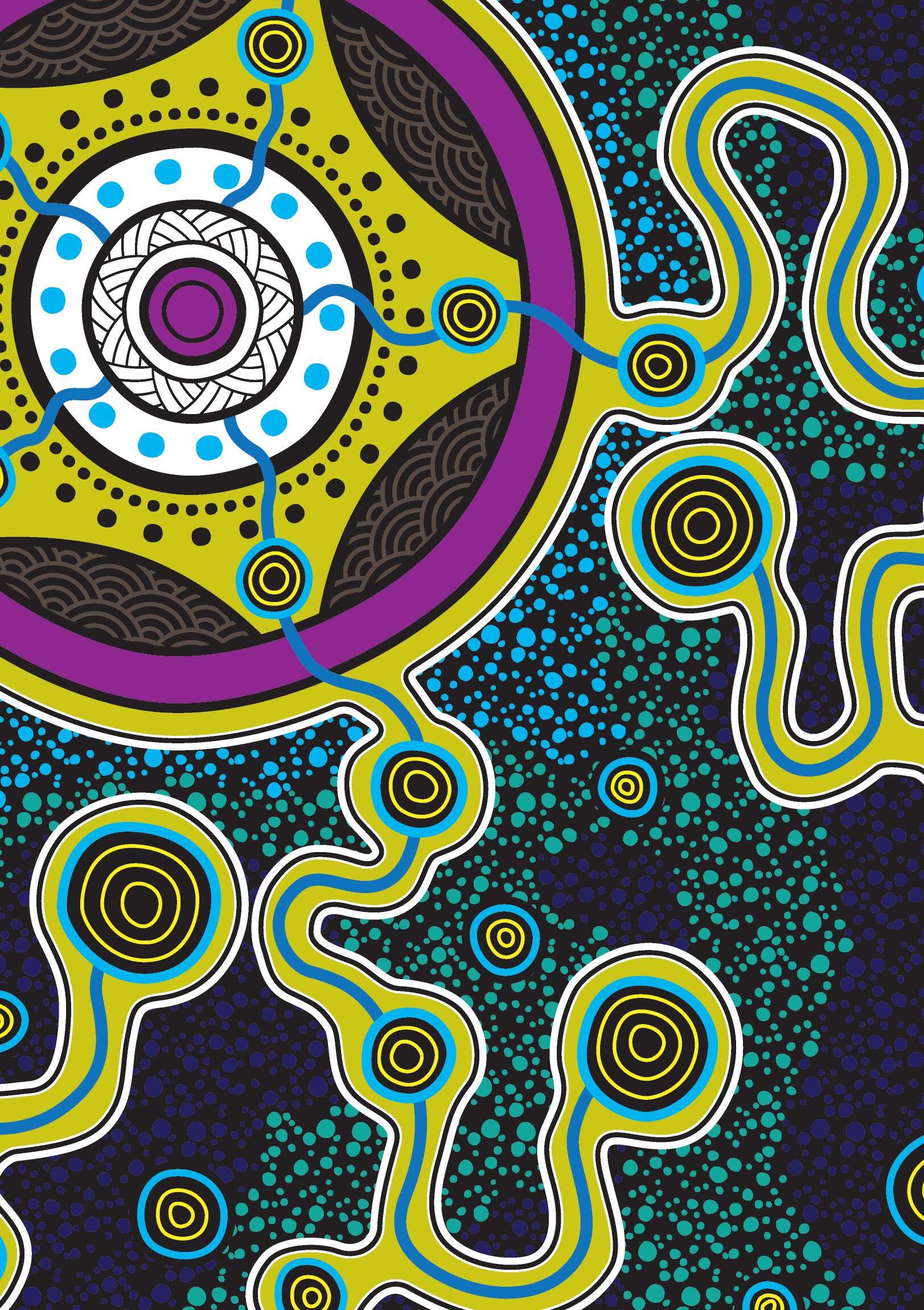
The EREA Charter is informed and enriched by the Scriptures, First Nations Knowings and Catholic Teaching. These three sources of wisdom, woven dynamically through our Charter, call us to both faithfulness and transformation.
The account of “Jesus is Rejected at Nazareth” (Luke 4:16-30) anchors our Charter. Jesus unrolls the scroll in the synagogue, quoting and interpreting Isaiah’s words of “good news to the poor” and “liberty to captives”, announcing a radical vision for the world.
The First Nations people of Australia feel the presence of the Spirit in the land, calling all to listen and respond to the invitation to walk in truthful relationship with that land and with one another. Miriam-Rose UngunmerrBaumann’s “Dadirri” and the “Uluru Statement from the Heart” capture the past, present and future of this Dreaming.
We, the People of God responding as the Church, reflect the consistent call of our leaders to transform the world. John XXIII reminds us of the “requirements of justice and peace”. Benedict XVI encourages us to be “more than mere spectators”. Francis, like Jesus in Luke 4:16-30, announces a change of era where our creative capacities are needed by the world.
We, as Catholic Schools in the Edmund Rice tradition, view these wisdoms through the lens of the EREA Charter. Our young people, who recognise the good in the world and in each other (Philippians 4:8-9), are the present and future of this journey.
The following threads of wisdom, inspired by Luke 4:16-30, Miriam Rose UngunmerrBaumann, the Uluru Statement from the Heart, John XXIII, Benedict XVI and Francis, are woven throughout the EREA Charter.
The Spirit of the Lord has been given to me... to the poor, good news.. to captives, release… sight to the blind, freedom to the oppressed... to proclaim the year of God’s favour Luke 4:16-20
It is easy for me to experience God’s presence... with power over our destiny our children will flourish… there is nothing so urgent that we must hurry… we invite you to walk with us to a better future
Miriam Rose Ungunmerr-Baumann | Uluru Statement from the Heart
We are not in a change of era, but an era of change… care for the poor is a requirement of justice and truth… in the way of the cross, we cannot be merely spectators… the world needs our creative and prophetic capacities Francis | John XXIII | Benedict XVI | Francis
In the late 1700s, a group of young visionaries from Waterford Ireland, inspired by their Catholic faith, formed by their work with the disenfranchised of their city, and aware of the discrimination that the people of an occupied Ireland faced, made a commitment to act. In 1802, inspired by the work of Nano Nagle and the Presentation Sisters, Edmund Rice and his companions opened a free school for boys in a New Street stable.
Facing many challenges, these courageous educators developed a relevant, relational, and faith filled pathway for young people to rise from demeaning poverty and hopelessness to live a life of dignity and full humanity. Edmund and his companions took vows as a religious community in 1808, forming the Christian Brothers in 1820. Edmund’s deep belief in God’s “providential presence in his life” inspired him to “open his whole heart to Christ present and appealing to him in the poor”.1
Edmund’s vision and belief led to an expansion of schools across Ireland and around the world. In the 1840s, at a time when Australian bishops were inviting European religious orders to assist with the provision of education, three Irish Christian Brothers travelled to Sydney. This brief ministry was followed by the arrival of Br Ambrose Treacy and three companions at Melbourne’s Station Pier in 1868. In the ensuing years, their faith and vision saw 120 schools open across Australia.
For generations of young people, Catholic education was a positive and lifegiving experience, but for many it was not. First Nations Australians suffered devastating dispossession and separation. The journey of Reconciliation and truth-telling remains one of the greatest challenges of our 65,000-year story.
Many young people were harmed by systemic abuse. The Christian Brothers have acknowledged and apologised for their part in the hurt and pain caused to these young people. This journey of healing continues.
In 2007, Edmund Rice Education Australia was formed. This family of schools strives to respond to the diverse needs of learners, from early childhood to early adulthood, across all regions of Australia. In 2023, new governance structures further ensured that, within safe and nurturing environments, and as part of a global movement of schools known as Edmund Rice Education Beyond Borders, over 40,000 young Australians are connected to the message of Jesus, the prophetic voice of the church and the charism of Edmund Rice.
We are called to be faithful to our heritage, our story, our faith, and the spirit of God in our lives.
How will I respond to this call to faithfulness?
How will our school communities respond to this call to faithfulness?
1Christian Brothers Charism Statement, 1982
As we begin the second quarter of the 21st Century, we are asked to reflect, in light of the Gospels and our Catholic faith, on the challenges we face as individuals, schools, communities and church. How do we learn, educate and grow with courage, faith and hope in order to be active participants in and leaders of change?
Our national and global communities provide signposts for this journey of transformation, collectively committing to the Alice Springs (Mparntwe) Education Declaration, the UNESCO Futures of Education and the Congregation of Catholic Education Global Compact on Education.
We join with the Australian educational community in contributing to an innovative education system that “encourages and supports every student to be the very best they can be, no matter where they live or what kind of learning challenges they may face.”2 EREA commits to this intent through “co-creating the learning conditions, dispositions and relationships to enable deep listening, confidence, agency and freedom.”3
We join with Pope Francis and our Church community in recognising that education is an “act of hope… grounded in solidarity”. The process of education must respond to the problems of the contemporary world and continue to find solutions to the needs of every generation. In this way, we proactively commit to the transformative evolution of the human journey.4
We join with the international educational community in affirming that education “has long played a foundational role in the transformation of human societies”, connecting us with the world and to each other, opening us to new possibilities, and strengthening our capacities for dialogue and action.5 We acknowledge that education itself must be transformed if we are to shape peaceful, just and sustainable futures with our young people.
In solidarity with the First Nations of the world, we commit to a movement for Reconciliation and Truth-Telling, walking together for mutual liberation, valuing Aboriginal and Torres Strait Islander Knowings and recognising Australia’s shared histories, cultures and achievements.6
On this journey of transformation, we are guided by the EREA Charter, with our Touchstones as the measure of our authenticity. Through a liberating education, based on a Gospel spirituality, within an inclusive community, committed to justice and solidarity, we co-create a better world for all.
The call to transformation asks us to be courageous and visionary, just as Jesus and Edmund were, and collectively work toward a transformed world.
How will I courageously respond to this call to transformation?
How will my school community courageously respond to this call to transformation?
2 Alice Springs (Mparntwe) Education Declaration
3 EREA Learning Statement: Implementing Liberating Practice
4 Pope Francis: Congregation of Catholic Education Global Compact on Education
5 UNESCO Futures of Education Report
6 EREA Strategic Directions 2021-2024

My EREA school is a place where we see, we learn, we experience, we feel, we collaborate, we serve, we listen, we pray, we reflect, we grow, we act, we speak, we stand with… to make God’s vision of a world made whole a living reality.

Empowered by liberating teaching and learning experiences, we open our hearts and minds, so that we are hope-filled and free to build a better world for all.

You are the light of the world… Your light must shine before others… (Matthew 5:16)
1. respond to Jesus’ radical message of liberation, creating learning environments where all can grow in confidence, agency and freedom.
2. deeply listen to all voices in order to build communities of safety, empathy, active participation and care for wellbeing.
3. recognise the strengths, capacities and needs of each learner, celebrating success and achievement which enables the realisation of aspirations and pathways.
4. implement liberating practices, inspired by our First Nations people, our Church and our education partners to create authentic, flexible and relevant learning experiences.
5. value critical awareness of justice and peace issues through the curriculum, service and solidarity learning, environmental practices and the culture of the school.
6. promote renewal and growth through reflective and compassionate practice, formation and professional development.
7. challenge and support each other to exercise agency and leadership within the school community and beyond.
8. commit to cycles of learning, unlearning and relearning, to improve the educational experience of First Nations young people and the cultural competency of all Australians.
How do I bring light and life to the world?
Which stories are important in my learning journey?
How do I confidently contribute to a better world?
Jesus’ invitation to love, justice, compassion, peace and faith, calls us to life-giving relationships within our communities and the wider world.
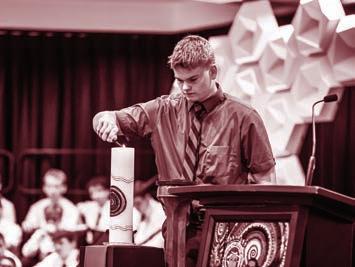
The water that I give will become a spring within you…
(John 4:14)
1. live and grow as a community by fostering personal relationships with God through Jesus Christ.
2. celebrate the life, death and resurrection of Jesus Christ, committed to serving those most in need.
3. nurture and encourage the spiritual development of everyone through reflection, prayer, symbols, sacred stories, rituals and rites of passage.
4. are inspired by the Gospel to forgive, act with compassion and seek justice as we resolve conflict.
5. offer formation, spirituality and retreat experiences as fundamental components in each young person’s faith journey.
6. recognise and act upon the Gospel commitment to the disenfranchised through a priority for those in need.
7. discover the mystery of God in all creation, Jesus Christ, Blessed Edmund Rice and the sacred stories woven through our communities today.
8. walk alongside First Nations peoples, committed to reconciliation and honouring First Nations spirituality.
9. are engaged in inter-faith dialogue, honouring the sacredness lived by those from various religious traditions.
Am I a living spring in my community? In my EREA school…
Where and when do I feel God’s presence?
Do I actively stand by my beliefs?
We welcome and celebrate diversity in our local, national and global communities, responsive to each person’s aspirations and needs, and committed to the common good.

1. respond to Jesus’ command to love, nurturing the dignity of each person as uniquely reflecting the image of God.
2. demonstrate a preferential option for families who might not seek enrolment due to their experience of poverty and disadvantage.
3. design school programs which enable all to participate with dignity and confidence.
4. welcome and value all members of the school community regardless of religion, race, ability, gender and sexual orientation.
5. recognise the strengths and capacities of each member of our community and support them to develop and achieve their aspirations.
6. work in partnership with the local Catholic community in serving the universal Church.
7. acknowledge the service and contribution of the Christian Brothers, working in partnership with all Edmund Rice ministries in furthering the Charism.
8. acknowledge the traditional ownership and heritage of the Country/s on which our school is placed, seeking to create safe places where cultural practice is respected and integrated.
9. engage with, learn from, and contribute to the national and global community of Catholic schools in the Edmund Rice tradition.
In my EREA school…
What does Jesus’ call to “love one another” mean to me?
How deeply do I listen before I act?
Why is it hard to show courage, rather than caution?
We are committed to local and global justice and peace, grounded in a spirituality of action and reflection, inspiring us to listen to, walk with and learn from all creation, especially those who experience powerlessness.
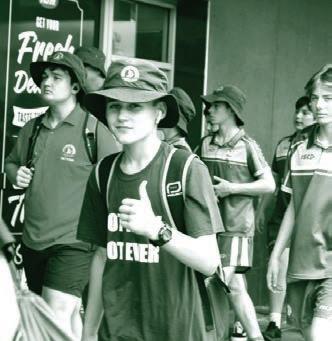
This is what God asks of you - to act justly, love mercy and walk humbly with your God… (Micah 6:8)
1. in the light of Gospel practices, participate in and lead prophetic advocacy for just causes.
2. learn through a curriculum that integrates themes of justice and peace, underpinned by Catholic Social Teaching.
3. participate in service and solidarity learning programs in partnership with those who experience unjust structures and systems.
4. grow through local and global programs in which we form relationships, work with and learn, leading to mutual transformation.
5. learn from the First Nations Peoples of Australia, through truth telling, fostering local relationships and advocating for justice, equity and healing.
6. are actively involved in developing global partnerships through participation in Edmund Rice Education Beyond Borders.
7. demonstrate a deep reverence for the earth as both God’s work and our home, working towards a sustainable and regenerative future for all creation.
8. recognise we are part of a global community and actively support the development of all humanity.
9. nurture a culture of critical reflection and prayerful discernment in justice and peace issues.
my EREA school…
How do I act justly and walk humbly?
Where do I recognise the powerless in the world?
Why is truth important?
The Charter for Catholic schools in the Edmund Rice Tradition is the central expression of the purpose and identity of EREA. School Renewal provides an opportunity for schools to reflect on how the Charter and its Touchstones are evident within the life of the school. It also recognises that developments in the expression of the Charter and Touchstones in a particular school can make a significant contribution to the flourishing of EREA as a whole.
Vicki Clark, a Mutthi Mutthi Wemba Wamba woman, has dedicated her life to expressing First Nations spirituality through art and advocacy. Vicki is committed to strengthening understanding between First Nations and non-First Nations Australians. Vicki’s First Nations Touchstone images continue to inspire the EREA Charter.
Robert Paul is of Juru descent, born in Bowen in 1963. His use of contemporary designs and colours, along with his interpretation of Traditional Indigenous Art, allows him to tell a story while educating the public about some of the symbolism used in Indigenous Art.

